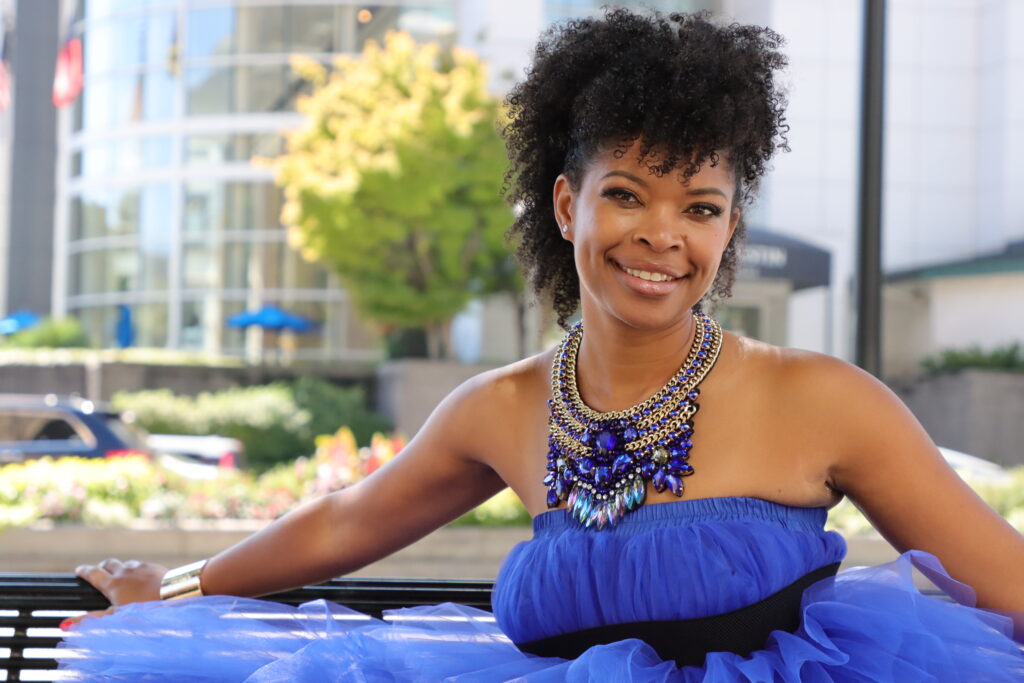The Churn
Martina Edwards, One of Wall Street’s First Black Women Traders, is Building a Legacy of Wealth in Underserved Communities
Mike JordanFebruary 11, 2021

As chief of strategic partnerships for the nonprofit community lending organization ACE (Access to Capital for Entrepreneurs), Martina Edwards spends much of her day dealing with money.
It’s nothing new for the Atlanta resident, who has almost 20 years of executive finance experience in education, banking and foundations. She’s managed money in all sorts of ways, from corporate partnerships to private wealth, as well as financial coaching classes where she teaches simple household budgeting.
And she does all this while managing a family of dudes; she and her husband Lindsay have two young sons running around not concerned about the level of focus it takes Mom to do important community work.
If that sounds impressive, you haven’t heard the part that makes Martina a living part of Black History: She was Merrill Lynch’s first Black woman broker ever to trade on the floor of the New York Stock Exchange.
If you’re thinking, “Wait, I thought that Lauren Simmons,” the answer is “almost.” Simmons, a Marietta native, was indeed the NYSE’s youngest-ever woman trader, and is also African-American.

(Photo Credit: Lauren Simmons/Facebook)
And since America is recognizing the brilliance and resilience of Black women more than ever these days, we figured Martina would be a perfect person to guide us into the future of financing, or at least keep us from Robinhood-ing ourselves into financial ruin. So I reached out to see if she’d be willing to share a little free game, and learned that I was far from the only person calling for dollarly advice.
[Editor’s note of disclosure: Martina and I have been friends for 25 years. Her husband Lindsay, whose own career includes executive positions at Goldman Sachs and JP Morgan Chase, is my college roommate from Morehouse. I totally expect them to save me from myself if I ever get too tipsy and hop on social media asking strangers about Dogecoin.]
Growing up in rural Alabama taught her not just the value of hard work, but the importance of good financial management.
When she was nine, she moved with her family to Montgomery, which felt like a big city to her at the time.
“This was the home of Civil Rights, right down from Selma, the Edmund Pettus bridge, all that stuff. But when we got to Montgomery, my parents got divorced, and by the time I hit high school, my mother had gone through bankruptcy and was working two jobs — really a lot. And although I was involved in activities, I always had a job in high school. I was a lot more mature,” she says.
“I was there with my mom when she got turned down for car loans, and you still had to drive a beat up car that didn’t have power steering, and at times walk to the grocery store. We just made an adventure out of it.”

The adventure is now her career, and along with making history, the self-made financial whiz has accomplished a lot since leaving Alabama, including earning a finance degree from Tuskegee University and an MBA from UNC’s Kenan-Flagler Business School, and joining Delta Sigma Theta Sorority, Inc.
After graduating from Tuskegee, Martina secured a summer internship with Procter & Gamble in Ohio. She parlayed that into another internship, this time with Sponsors for Educational Opportunity, which helps put high-achieving students of color on Wall Street.
Her talent with numbers earned her more and more attention, particularly during a summer she spent working at Merrill Lynch, which took a chance and purchased a seat for her on the NYSE.
And how much did a seat on the NYSE cost when Merrill Lynch took a chance on #BlackGirlMagic back in 2004? That would be just under a million dollars.
That’s because there are a fixed number of seats, which means the laws of supply and demand are at play, and the cost to be present where big money is moving definitely isn’t cheap. By investing in herself through education and hard work, Martina got a huge, famous investment bank to bank on her talent, which she’s paying forward in her work today.
Now, in her role at ACE, which is the largest exclusively focused CDFI (Community Development Financial Institution) in the state of Georgia, Martina focuses on moving capital to underserved people and places, particularly small businesses. She spends her days helping small-business owners and low-income entrepreneurs across Metro Atlanta and rural North Georgia — particularly women and people of color — find equitable access to financing. And of course raising two young boys along with her husband.

Since she’s in a position to share financial expertise with the community, she gets a lot of questions from green-eyed new investors.
“There were a lot of people who in 2020 — you know, maybe being at home and having more time — definitely wanted to get involved with the market,” Martina says when we spoke on a recent Friday afternoon. “I had people from cousins to sorority sisters hitting me up.”
One of the keys is to understand your own personal financial picture, she believes. And not everybody is ready to start investing, despite what TV, radio and the internet may be telling people.
She also thinks people need to understand that there’s a difference between trading and investing.
“A trader is someone who is in it every day. They utilize different strategies, manage risk and reduce exposure. And when you trade, you cannot be emotional about the stock that you get into. I’m happy that the Robinhoods of the world, E-Trade, Charles Schwab and even Merrill Lynch have apps that have helped democratize access. But there has been a major shortage in providing education around what investing looks like.”
Martina says she’s downloaded and used Robinhood herself, just to be aware of how it works. But she’s not a fan of how the app has gamified investing by offering free additional stocks when you make certain stock purchases. “People are not really conscious of what they’re doing,” she says.
“The newcomers to the market, I think, are in FOMO World — they have fear of missing out. and they chase gain. They trade on momentum, versus fundamentals and technicals. If you are a trader, you have to actually understand what a company does and why you’re buying into it, and you can’t just buy it because you like it.”
If you’re wondering, “Is she talking about my GameStop and AMC stonks,” the answer is “well, yeah, especially if you just got in when everybody on Reddit got down, and oh yeah, because you love Tekken.
“I think there was market manipulation,” she says of the epic short squeeze that happened a couple weeks ago with GME on WallStreetBets.
“If there’s something that naturally happens with a company that makes the stock go up, and people have to cover their shorts because they get squeezed, that’s one thing. I feel like there were bots, and smaller investors as well, that were manipulating folks, trying to say, get behind this tool, this movement that we have to hurt hedge funds. Well, hedge funds invest on behalf of public pension funds. Public pension funds invest on behalf of firefighters, teachers, healthcare workers, your parents and your grandma. So when they blow up, by default, it blows other folks up.”

She also has an ominous bit of advice for folks who’ve been flipping stocks as of late: Be ready for the tax lady.
“Tax season will be a rude awakening indeed, for some,” she warns. “A lot of nascent investors will be getting hit with unexpected short-term capital gains, getting taxed at 10 to 30 percent of their income, versus long-term investing — holding stocks for at least one year if they’ve been going in and out of stock positions.”
She says that’s not necessarily a bad thing, but it’s also not something that’s usually mentioned when you sign up for a trading app, and many people will discover they have higher than expected tax liability when their brokerage 1099 arrives from the IRS.
She has a few tips when it comes to retail investing, especially for the recently initiated.
- Know that investing has tax implications.
- Be aware that gains and losses can be offset annually.
- Manage your risk exposure.
- Have an entry/exit plan, so when it’s time to decide on taking the appreciation or holding for lower long-term gains, you’re ready.
“My point: it’s more than clicking ‘buy’ or ‘sell,’” she says.
Martina has clearly spent some time thinking about the current frenzy, and although she doesn’t call herself an investment advisor, she does share a few big-picture thoughts.
“Investing for me is about diversification. When I invest, it’s a broader approach that I have about realizing financial goals. 90 percent of the time, when I get ready to trade, I pull together a spreadsheet. I figure out how much money I want to invest in the market. And then I list out the 10 to 25 that I have interest in. I make sure that every time I invest, those different stocks represent various sectors of the market that I believe in.”

She believes there’s a future in electric vehicles, pays a lot of attention to technology and healthcare, and says she sticks to her spreadsheet with intense discipline. And she says her investment strategy is based on four overall concepts.
“You want to preserve your wealth, grow your wealth, enjoy it, and transfer it onto the next generation, if you have determined that you have additional capital available and that you want to invest.”
Though both Martina and Lauren have moved on from the ruckus of the Wall Street trading floor, Martina says they stay in touch, particularly when it comes to figuring out if they’re really the first two of their kind. While many media outlets have reported that Martina is the first Black woman ever on the NYSE floor from any investment bank, she and Lauren have heard about other hidden figures from decades past who were there and braved intimidation and lack of celebration as they pioneered a way for them.
It’s something Martina says she wants righted, for history’s sake. And she’s ready to see a future with more women of color gaining more career footing in finance, which is why she uses her position today at ACE to boost others to higher ground.
“If I look at CNBC every single day, and all I see is a sea of white faces and they’re men, I subconsciously or consciously will start to associate that this role is not for women. So you know, that that’s a problem that still needs to be worked on.”
Hopefully that means history is still in the making.

